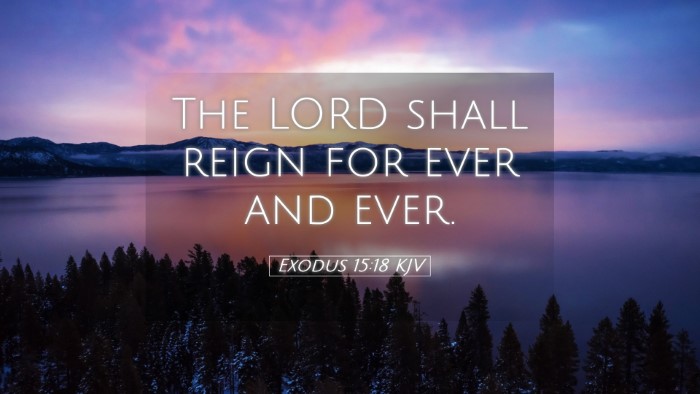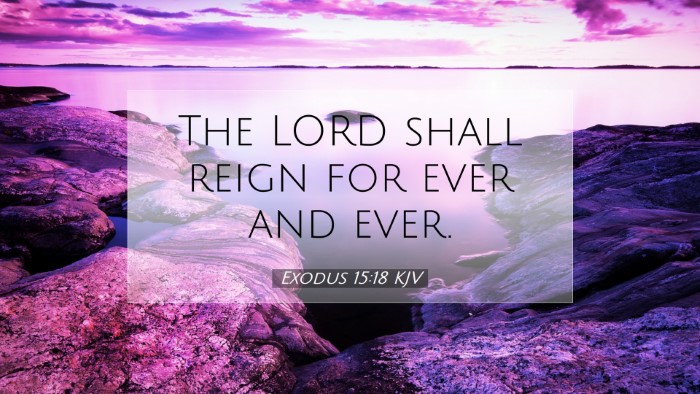Commentary on Exodus 15:18
Verse: "The LORD shall reign for ever and ever."
Introduction
Exodus 15:18 is a profound declaration of God's eternal sovereignty. This verse is nestled within a celebratory song sung by Moses and the people of Israel after their deliverance from Egypt. It serves as both a proclamation of faith and a recognition of God's unchanging nature amidst the tumultuous circumstances the Israelites faced.
Historical Context
The context of this verse lies after the miraculous crossing of the Red Sea, marking a pivotal moment in the Exodus narrative. The Israelites had witnessed God's power in delivering them from Pharaoh's oppression. As they celebrate, they not only reflect on past deliverance but also look forward to God's reign.
Thematic Analysis
Exodus 15:18 encapsulates several critical themes that resonate throughout Scripture:
- Divine Kingship: The declaration "The LORD shall reign" emphasizes God's sovereign authority over all creation. His reign is both a comfort and a command, inviting His people to trust in His governance.
- Eternality: The phrase "for ever and ever" points to God's eternal nature. Unlike earthly rulers, God's reign is not confined to temporal boundaries but transcends time.
- Hope and Assurance: This verse serves as a reminder that despite present struggles, God's ultimate victory is assured. For the Israelites, it assured them of protection and guidance in their journey towards the Promised Land.
Insights from Commentaries
Matthew Henry
Matthew Henry highlights that this declaration of God’s eternal reign is meant to instill hope in believers. He notes, "He has wrought for us, and we praise Him; he has begun to reign among us, and His reign is uninterrupted." Henry argues that God’s sovereign governance assures His people of victory over all enemies, encouraging them to continue praising God in their wilderness experiences.
Albert Barnes
Albert Barnes elaborates on the significance of God’s reign as it reflects His omnipotence and sovereignty. He states, "The reign of God is not like the fickle governments of men. His kingdom is everlasting, established in righteousness." Barnes emphasizes that the reign of God provides a contrast to temporal powers, offering believers a foundation for their faith amidst the ever-changing political and social landscapes.
Adam Clarke
Adam Clarke provides a nuanced interpretation of the term "LORD" in the text, which, in Hebrew, is Yahweh. He underscores that this name denotes a personal relationship between God and His people. Clarke reflects on the significance of God’s promise to reign forever, asserting that it signifies both His current moral rule and His future established kingdom where justice and peace will prevail.
Theological Reflections
This verse invites deep theological reflection on the nature of God's rule:
- God's Sovereignty: Understanding God's reign requires acknowledgment of His absolute rule over creation. This sovereignty implies that nothing happens outside of His will and purpose.
- Covenantal Relationship: The declaration of God's eternal reign suggests a covenantal God who is invested in the lives of His people. He not only rules over them but also guides and protects them.
- Anticipation of Future Fulfillment: The statement also looks forward to eschatological themes within Scripture, where God's reign is fully realized in the new heaven and new earth, as portrayed in Revelation.
Practical Applications
The implications of Exodus 15:18 are profound for our lives today:
- Trust in God's Reign: Believers are encouraged to place their trust in God’s sovereign reign, especially during uncertain times, knowing He is always in control.
- Embrace Praise: Like the Israelites, praise should be central in the lives of believers, serving as a reminder of God’s past faithfulness and future promises.
- Living as Subjects of the King: Understanding God’s eternal reign calls for a lifestyle of obedience and submission to His will, showcasing His kingdom values in our daily lives.
Conclusion
Exodus 15:18 stands as a timeless reminder of God's sovereign reign that transcends all generations. It calls for reflection on His past delivery, a recognition of His eternal kingdom, and a commitment to live under His rule. The insights provided by esteemed commentators serve to deepen our understanding and application of this critical biblical truth.


